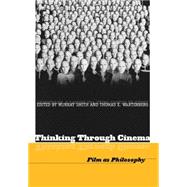
What is included with this book?
Thomas E. Wartenberg is Chair of the Philosophy Department at Mount Holyoke College, where he also teaches in the Film Studies Program. He is the author of Unlikely Couples: Movie Romance as Social Criticism (Westview Press, 1999) and The Forms of Power: From Domination to Transformation (Temple University Press, 1990), the editor of The Nature of Art (Wadsworth Publishing, 2001), and the co-editor of Philosophy and Film (Routledge, 1995)and The Philosophy of Film: Introductory Text and Readings (Blackwell, 2005).
| Preface | |
| Introduction | p. 1 |
| The Very Idea of Film as Philosophy | |
| Theses on Cinema as Philosophy | p. 11 |
| Beyond Mere Illustration: How Films Can Be Philosophy | p. 19 |
| Film Art, Argument, and Ambiguity | p. 33 |
| Popular American Film: Entertainment and Enlightenment | |
| Hitchcock and Cavell | p. 43 |
| The Paradox of the Unknown Lover: A Reading of Letter from an Unknown Woman | p. 55 |
| Spike Lee and the Sympathetic Racist | p. 67 |
| Transparency and Twist in Narrative Fiction Film | p. 81 |
| The Impersonation of Personality: Film as Philosophy in Mission: Impossible | p. 97 |
| On Being Philosophical and Being John Malkovich | p. 111 |
| Eternal Sunshine of the Spotless Mind and the Morality of Memory | p. 119 |
| Continental Philosophy, Continental Film | |
| Sartre, the Philosophy of Nothingness, and the Modern Melodrama | p. 135 |
| Cinema and Subjectivity in Krzysztof Kieslowski | p. 147 |
| Is Sex Comedy or Tragedy? Directing Desire and Female Auteurship in the Cinema of Catherine Breillat | p. 157 |
| Film as "Theory": The Avant-Garde | |
| Apperception on Display: Structural Films and Philosophy | p. 165 |
| Philosophizing Through the Moving Image: The Case of Serene Velocity | p. 173 |
| The Substance of Cinema | p. 187 |
| The World Rewound: Peter Forgacs's Wittgenstein Tractatus | p. 199 |
| Contributors | p. 213 |
| Selected Bibliography | p. 217 |
| Index | p. 221 |
| Table of Contents provided by Ingram. All Rights Reserved. |
The New copy of this book will include any supplemental materials advertised. Please check the title of the book to determine if it should include any access cards, study guides, lab manuals, CDs, etc.
The Used, Rental and eBook copies of this book are not guaranteed to include any supplemental materials. Typically, only the book itself is included. This is true even if the title states it includes any access cards, study guides, lab manuals, CDs, etc.